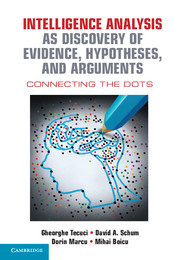Book contents
- Frontmatter
- Contents
- Preface
- Acknowledgments
- About the Authors
- 1 Intelligence Analysis: “Connecting the Dots”
- 2 Marshaling Thoughts and Evidence for Imaginative Analysis
- 3 Disciple-CD: A Cognitive Assistant for Connecting the Dots
- 4 Evidence
- 5 Divide and Conquer: A Necessary Approach to Complex Analysis
- 6 Assessing the Believability of Evidence
- 7 Chains of Custody
- 8 Recurrent Substance-Blind Combinations of Evidence
- 9 Major Sources of Uncertainty in Masses of Evidence
- 10 Assessing and Reporting Uncertainty: Some Alternative Methods
- 11 Analytic Bias
- 12 Learning and Reusing Analytic Expertise: Beyond Disciple-CD
- Glossary of Terms
- References
- Appendixes
- Index
11 - Analytic Bias
Published online by Cambridge University Press: 05 August 2016
- Frontmatter
- Contents
- Preface
- Acknowledgments
- About the Authors
- 1 Intelligence Analysis: “Connecting the Dots”
- 2 Marshaling Thoughts and Evidence for Imaginative Analysis
- 3 Disciple-CD: A Cognitive Assistant for Connecting the Dots
- 4 Evidence
- 5 Divide and Conquer: A Necessary Approach to Complex Analysis
- 6 Assessing the Believability of Evidence
- 7 Chains of Custody
- 8 Recurrent Substance-Blind Combinations of Evidence
- 9 Major Sources of Uncertainty in Masses of Evidence
- 10 Assessing and Reporting Uncertainty: Some Alternative Methods
- 11 Analytic Bias
- 12 Learning and Reusing Analytic Expertise: Beyond Disciple-CD
- Glossary of Terms
- References
- Appendixes
- Index
Summary
The topic of bias comes up repeatedly in works on intelligence analysis. Much of the discussion is based on research performed by psychologists decades ago. As a result of this research, psychologists have made some depressing and quite unreasonable claims about the extent of our inferential rationality. Conclusions reached and reported in this research have formed an important basis for the very influential work of R. J. Heuer (1999).
In this chapter, we will discuss different biases that have been identified in intelligence analysis and how Disciple-CD can help recognize and partially counter them. We will begin by examining various meanings attached to the term bias and to its various origins and possible species and relations. Also important are possible value-related consequences for the persons whose views are labeled as being biased in various ways. Reading other existing works on bias in intelligence analysis, many persons are likely to conclude that the only origins of bias are the intelligence analysts themselves. But there are other important origins of possible bias, including the sources of intelligence evidence (i.e., HUMINT), persons in chains of custody of intelligence evidence, and the policy-making customers of intelligence analyses. These additional classes of sources have their own species of bias.
BASIC INTERPRETATIONS OF THE TERM BIAS
The term bias arises in a variety of different contexts, some of which do not concern us, such as in dressmaking and in the game of bowls. A dressmaker is said to make cuts along the bias, meaning that he or she makes oblique cuts across the warp of a fabric. In the game of bowls, the swerving course of a bowl when thrown or lagged is termed bias. Bias does, of course, have some technical uses such as in statistics, machine learning, and engineering. In statistics and machine learning, we speak of a biased result if it is distorted in some way and arises from a neglected factor or an approximate model learned. In electrical engineering, one form of bias refers to steady voltages applied to an electronic device to stabilize its operation or to minimize distortions in recordings. But our interests concern the use of the term bias with reference to people's views, beliefs, opinions, and related behaviors; this use began in the midsixteenth century (Chantrell, 2004, p. 52).
- Type
- Chapter
- Information
- Intelligence Analysis as Discovery of Evidence, Hypotheses, and ArgumentsConnecting the Dots, pp. 213 - 224Publisher: Cambridge University PressPrint publication year: 2016



